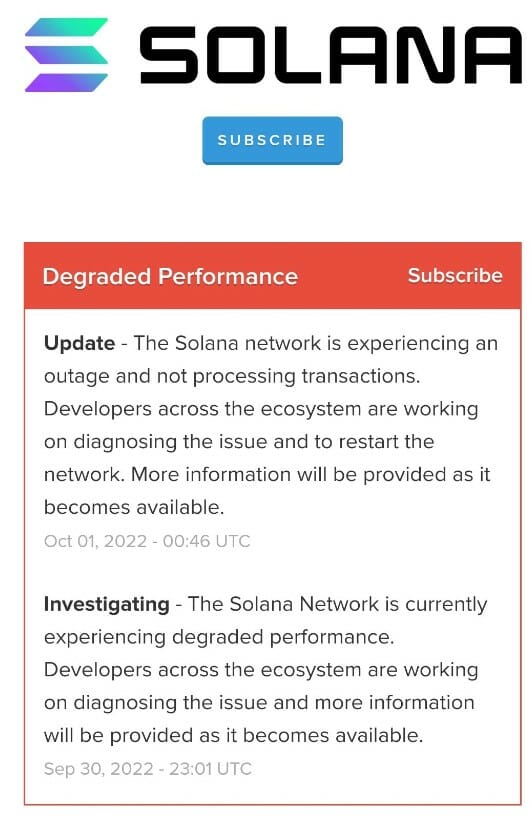Key Takeaways
- On Friday night, Solana announced that the network was “experiencing degraded performance.”
- Solana has suffered at least 7 network outages since its launch in 2020, with 6 of them coming this year.
- The Solana blockchain is back up and running after the glitch.
Solana network has recently been plagued with recurring network outages. On Friday night, Solana announced that the network was “experiencing degraded performance” and that Solana developers were working on diagnosing the issue.
“The Solana network is experiencing an outage and not processing transactions. Developers across the ecosystem are working on diagnosing the issue and restarting the network. More information will be provided as it becomes available”, the blockchain’s announcement reads.
A few hours after this, Solana tweeted that it had performed the necessary restart of Mainnet Beta at 8 a.m. London time. “The network operators will continue to restore client services over the next several hours,” the tweet reads.
According to Solana validator stakewiz.com a misconfigured node might have caused an unrecoverable partition in the network resulting in the outage. Stakewiz further added that the Solana codebase should have handled the issue, but for some unknown reason, it caused an unrecoverable partition or fork. They believe the misconfiguration was an accident, “probably a failed node failover setup.”

The latest news only cements Solana’s position as a weak blockchain known for its network troubles. Solana co-founder Anatoly Yakovenko has also stated that network outages continue to be the Solana network’s biggest challenge. Launched in 2020, the Solana network has suffered several concerning network halts, which have come from a number of different congestion and spam events.
Solana has suffered at least 7 network outages since its launch in 2020, with 6 of them coming this year. One of the longest production outages lasted up to 17 hours in September 2021. Solana then attributed the outage to a distributed denial-of-service (DDoS) attack on an initial decentralized exchange offering with bots spamming the network with 400,000 per second.
In January this year, over 29 hours of partial outages and network instability were recorded between the 21st and 22nd, with excessive duplicate transactions again causing network congestion and outages on the blockchain.









